Here is why it’s unlikely you will develop a latex allergy sleeping on a latex mattress.

Table of Contents
Latex allergies are rare, affecting less than 1% of the population. They’re more common in healthcare workers, though, because of occupational exposure to latex gloves and other latex medical equipment. Understandably, then, you might wonder if you can develop a latex allergy from a mattress.
For more on latex allergy, see this excellent write-up from the American College of Allergy, Asthma, and Immunology.
Can a latex mattress cause a latex allergy?
The quick answer is that, yes, technically, you could develop a latex allergy from sleeping on a latex mattress. However, this would likely require you to sleep directly on the latex night after night and for the latex to have been made differently to the majority of latex used in mattresses.
In most cases, a properly produced latex mattress is extremely unlikely to pose a risk of latex allergy. In fact, most latex mattresses are perfectly fine for those already allergic to latex. This is because latex allergy is an allergy to proteins in latex, and these proteins are no longer present in the types of latex found in mattresses.
Latex manufacture and allergies
During latex mattress production, the latex is washed, which eliminates a large amount of the proteins. The latex is then flash-heated or vulcanized, which destroys remaining proteins.
The type of latex in mattresses is quite different, then, from latex used for medical equipment, pacifiers, gloves, and condoms. Stretchy latex is typically cold-dipped and still contains proteins that can trigger allergy.
Finally, most of the latex in a mattress is wrapped in another material such as wool and cotton. That means you get little, if any direct exposure to latex itself. If you do have a latex allergy, though, you may want to avoid home assembly mattresses with exposed latex layers. A ready-made mattress may be a better choice to minimize risk.
Can a crib mattress cause latex allergy in babies?
Many crib mattresses are now made with latex instead of polyfoam. This can raise concerns over the development of latex allergy in infants. Again, unless a baby is sleeping on exposed latex that has been manufactured in an atypical way, it is very unlikely to trigger allergy symptoms.
Instead, most latex allergy in infants can be linked to the latex in bottle teats, pacifiers, balloons, nose cleaners, and repeated exposure to medical equipment in a healthcare setting. There are no documented cases of latex allergy caused by infants sleeping on a latex mattress (R).
Unless there’s a family history of latex allergy, or a known latex allergy, there’s little reason to rule out a latex crib mattress.
The one study that looked at latex mattress allergies found no difference in the development of latex allergy in children who slept on a latex mattress compared to those who slept on a non-latex mattress (R).
Final thoughts on latex allergies and latex mattresses
As we’ve seen, a latex mattress is unlikely to cause a latex allergy. If you’re uncomfortable handling latex, though, don’t worry. There are plenty of great options for eco-friendly, organic, latex-free mattresses as well as mattresses where latex layers are fully wrapped in organic cotton.
A ready-assembled latex hybrid mattress, where you don’t handle any latex directly, can also be a great choice if you have concerns over latex allergies.
Check out our top picks for mattresses in a box, and our review of the Spindle mattress, which has three latex layers all individually wrapped in organic cotton.